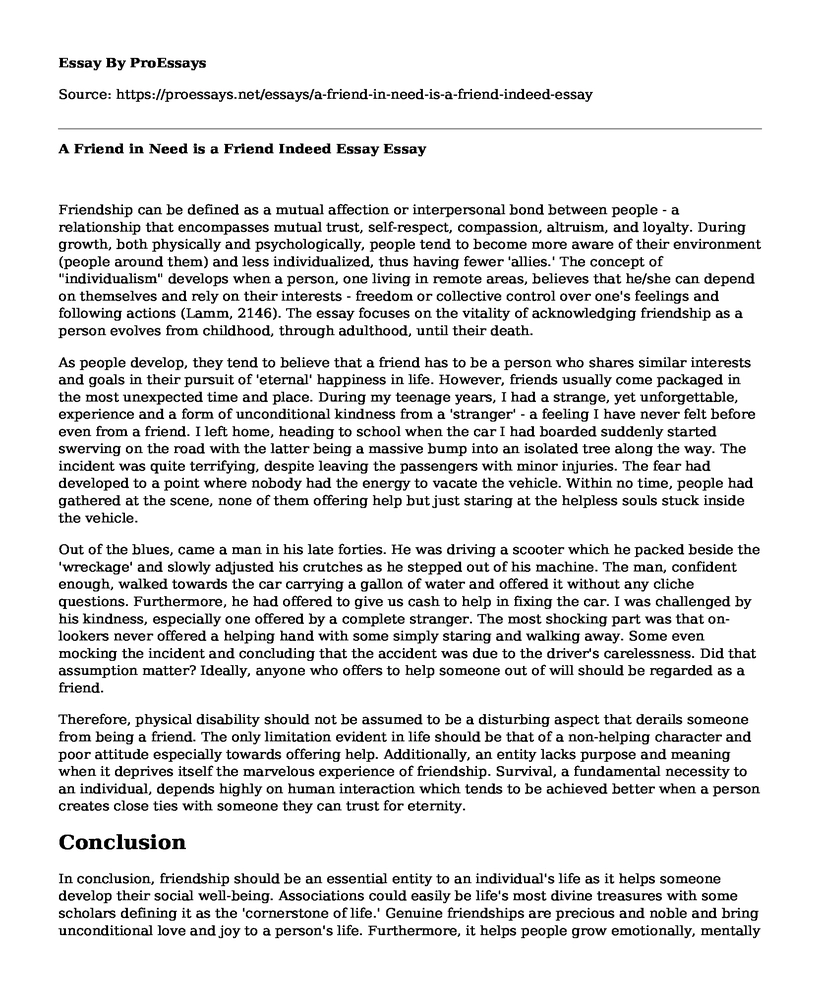Friendship can be defined as a mutual affection or interpersonal bond between people - a relationship that encompasses mutual trust, self-respect, compassion, altruism, and loyalty. During growth, both physically and psychologically, people tend to become more aware of their environment (people around them) and less individualized, thus having fewer 'allies.' The concept of "individualism" develops when a person, one living in remote areas, believes that he/she can depend on themselves and rely on their interests - freedom or collective control over one's feelings and following actions (Lamm, 2146). The essay focuses on the vitality of acknowledging friendship as a person evolves from childhood, through adulthood, until their death.
As people develop, they tend to believe that a friend has to be a person who shares similar interests and goals in their pursuit of 'eternal' happiness in life. However, friends usually come packaged in the most unexpected time and place. During my teenage years, I had a strange, yet unforgettable, experience and a form of unconditional kindness from a 'stranger' - a feeling I have never felt before even from a friend. I left home, heading to school when the car I had boarded suddenly started swerving on the road with the latter being a massive bump into an isolated tree along the way. The incident was quite terrifying, despite leaving the passengers with minor injuries. The fear had developed to a point where nobody had the energy to vacate the vehicle. Within no time, people had gathered at the scene, none of them offering help but just staring at the helpless souls stuck inside the vehicle.
Out of the blues, came a man in his late forties. He was driving a scooter which he packed beside the 'wreckage' and slowly adjusted his crutches as he stepped out of his machine. The man, confident enough, walked towards the car carrying a gallon of water and offered it without any cliche questions. Furthermore, he had offered to give us cash to help in fixing the car. I was challenged by his kindness, especially one offered by a complete stranger. The most shocking part was that on-lookers never offered a helping hand with some simply staring and walking away. Some even mocking the incident and concluding that the accident was due to the driver's carelessness. Did that assumption matter? Ideally, anyone who offers to help someone out of will should be regarded as a friend.
Therefore, physical disability should not be assumed to be a disturbing aspect that derails someone from being a friend. The only limitation evident in life should be that of a non-helping character and poor attitude especially towards offering help. Additionally, an entity lacks purpose and meaning when it deprives itself the marvelous experience of friendship. Survival, a fundamental necessity to an individual, depends highly on human interaction which tends to be achieved better when a person creates close ties with someone they can trust for eternity.
Conclusion
In conclusion, friendship should be an essential entity to an individual's life as it helps someone develop their social well-being. Associations could easily be life's most divine treasures with some scholars defining it as the 'cornerstone of life.' Genuine friendships are precious and noble and bring unconditional love and joy to a person's life. Furthermore, it helps people grow emotionally, mentally and psychologically - develop one's kindness, be philanthropic, and living life with more zest. However, friendships should not be entirely based on people who only relate to what you undergo in life but should also include those individuals who help you without necessarily demanding anything in return. Besides, people should value their friendships and seek to offer whole-hearted kindness to people, inclusive of strangers. Therefore, the phrase "a friend in need is a friend indeed" should act as a vital entity to an individual's life.
References
Lamm, Connie, Philip David Zelazo, and Marc D. Lewis. "Neural correlates of cognitive control in childhood and adolescence: Disentangling the contributions of age and executive function." Neuropsychologia 44.11 (2006): 2139-2148.
Cite this page
A Friend in Need is a Friend Indeed Essay. (2022, May 17). Retrieved from https://proessays.net/essays/a-friend-in-need-is-a-friend-indeed-essay
If you are the original author of this essay and no longer wish to have it published on the ProEssays website, please click below to request its removal:
- Effects of Same-Sex Parenting on Children Essay
- Should Drug Abuse Moms Be Granted Custody of Their Infants After Birth: The Ethical Issue
- Indigenous Community Welfare: Impact & Development - Essay Sample
- Essay Example on Egypt Uprising Aftermath: Protests Over Gov't Failure to Protect Minorities
- Essay Example on Who Owns a Child? Exploring the Debate on Paternity Fraud Laws
- ABA: Helping Autistic Kids Develop Social Skills - Essay Sample
- History: The History of Jews in Medieval Catalunia & Spain - Essay Sample







